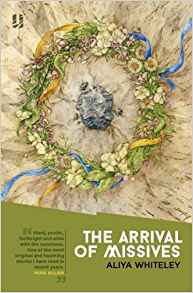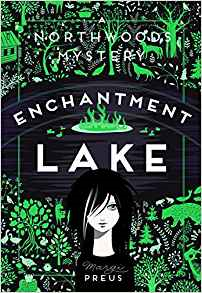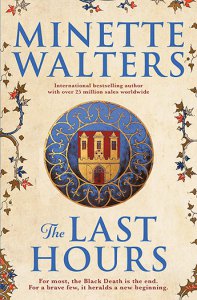 Before other things got in the way, I’d hoped to write about some of the books other Sharke judges had put on their shortlists. Since then the actual Sharke and Clarke shortlists have been chosen, and the award finally made, to Colson Whitehead for The Underground Railroad in case you missed it, but that doesn’t mean I can’t return to my original plan. I’ve been wanting to write about Aliya Whiteley’s The Arrival of Missives. More fool me, I didn’t include it on my own shortlist, which was silly, given that I’ve argued often enough that the novella is the word length par excellence for sf; and given too that we’re in the middle of a resurgence of interest in the novella as a literary form.
Before other things got in the way, I’d hoped to write about some of the books other Sharke judges had put on their shortlists. Since then the actual Sharke and Clarke shortlists have been chosen, and the award finally made, to Colson Whitehead for The Underground Railroad in case you missed it, but that doesn’t mean I can’t return to my original plan. I’ve been wanting to write about Aliya Whiteley’s The Arrival of Missives. More fool me, I didn’t include it on my own shortlist, which was silly, given that I’ve argued often enough that the novella is the word length par excellence for sf; and given too that we’re in the middle of a resurgence of interest in the novella as a literary form.
I will talk about the science-fictional elements of The Arrival of Missives in due course, but I’m going to begin by thinking out loud a little about what Arrival initially most reminded me of, certainly in its initial stages, and that’s Muriel Spark’s The Prime of Miss Jean Brodie. Everyone knows, or thinks they know, the story of Jean Brodie, the outspoken teacher with unusual methods, working in an atmosphere of stultifying conformity to transform a group of girls into la crème de la crème by countering the school’s emphasis on hard knowledge with a diet of art, romantic poetry, and her own extensive views on the world. It’s funny, yes, but tragic too, though not necessarily for the reasons I think people generally suppose. It’s tempting, perhaps, to see Jean Brodie fighting a lonely battle against a Gradgrindian emphasis on facts, but turn back to Spark’s original novella and you are quickly reminded that it is about Jean Brodie, an egotistical monster, overweening, self-regarding, deeply manipulative. She cares very little about the future of her girls, or about what they will do in the world, but a great deal about what they can do for her.
Thus, Brodie’s pleasure lies not in educating the girls for their own sakes, but in using them as proxies to play off her ex-lover, the one-armed art teacher, Teddy Lloyd, against her would-be lover, Gordon Lowther, the singing teacher. One of the most striking things is Brodie’s cruelty towards her protégées, especially poor put-upon Mary, who can do nothing right, though her behaviour towards Sandy and Rose is not that much better, as she manoeuvres Rose towards Teddy Lloyd’s bed, and attempts to enlist Sandy as her spy. The difference lies, perhaps, in the fact that Mary is desperate to please Miss Brodie whereas Sandy is much more detached. Yes, she and her friend Jenny are, in their way, obsessed with Jean Brodie, but their obsession is articulated through the collecting of knowledge about her. And what it is to have knowledge, as Sandy will come to realise.
For, after all, train a girl as a spy, and what is the likelihood that she will spy on you as well? Thus, much of the fascination in The Prime of Miss Jean Brodie lies not in Brodie’s hideously misguided enthusiasm and admiration of Mussolini and Hitler, but in the fact that Brodie has sown the seeds of her own destruction by creating a figure who will watch her, cold-eyed, learn her strengths, such as they are, and her weaknesses, which are many more than she will ever allow, and then use them against her at the right moment. If Jean Brodie has played a long game, then Sandy, her pupil, has played an even longer one, and played it better, not least because she recognises the damage that someone like Jean Brodie can do to genuinely impressionable minds. In fact, the key thing about most of the Brodie Set is that for all Jean Brodie’s careful selection of them, they will mostly escape her influence, though she will inevitably leave her mark on them. Sandy’s method of escape will prove to be possibly the most extreme, perhaps because she has paid most attention to Jean Brodie’s ways.
But what has this to do with The Arrival of Missives? It was the presence of Mr Tiller, the school master with a war wound, physically disabled, ‘not a real man’, that set me off on that particular train of thought, but the question I eventually found myself considering was the girlhood of Jean Brodie. Where does a creature like that come from? Arrival does not directly answer that question, but I feel the two novellas are somehow in dialogue with one another. Having said that, I believe Arrival is also loosely in conversation with a whole group of narratives published in the late 1920s, early 1930s, all written by women, and addressing issues concerning class and the education of young women. I’m thinking of Winifred Holtby’s South Riding, Alison Uttley’s A Country Child, and Nan Shepherd’s The Quarry Wood, to name but three I happen to be familiar with, but there are many more. The Prime of Miss Jean Brodie was published in 1961, but it’s set within the same time frame, as is arrival.
If there is a difference between Shirley Fearn and the other protagonists, it is perhaps that she is never less than utterly sure of herself, and of her destiny. There is little in the way of struggle, little to cause self-doubt. She knows with a burning certainty that she is intended for greater things than life as a farmer’s wife, and has determined that becoming a teacher will be her route out. For the reader, Shirley’s ambition is a disappointment, for it is not teaching in and of itself that absorbs her but the thought of teaching alongside Mr Tiller, her own teacher, with whom she believes herself to be in love. Thus, her horizons are already more limited than she seems to realise, even though she is aware that those set for her by others – her parents, the villagers – are just as limited. So, Shirley’s determination is less focused than she might believe.
But there are things that Shirley is aware of, not least that she is under constant scrutiny – her daily routines are so well-known she needs to account for even the slightest deviation, despite all her protestations that she can come and go as she likes – yet she is naively convinced that somehow, when it counts, she is invisible. She assumes she can apply to the teacher training college in Taunton without anyone noticing, whereas the moment she takes her letter to the post office, it becomes the talk of the village. She believes that her love for her teacher is a secret, yet everything about her screams the knowledge to even the least observant person. She may believe herself to be devious and powerful, but bookish Shirley Fearn is herself an open book.
The village, as we will learn, has a completely different plan for Shirley – and I don’t think it would be going too far to say that the entire village does connive in this. As the only farmer’s only child, Shirley will inherit the farm, but it is already presumed that she must marry in order to maintain the farm. Shirley might present herself as being as free-spirited as Bathsheba Everdene, but unlike Bathsheba, she has made no attempt to understand how the farm works, and from the village’s point of view she cannot be relied on to run it properly. And this is important for the village, at a time when many would still be looking to it for work of one kind or another.
Post-World War One, the need to maintain continuity is even more important, perhaps, given that so many have not returned. There is the perceived need to restore what has been lost, and to prevent it being lost again. That deeper attachment to land and family lends a folk-horror flavour to the narrative as the farmer and the church elders settle among themselves that Shirley will be May Queen, with all the attention that brings with it. It is also, though they don’t quite say it, a sexually charged occasion, and everyone has already settled on who Shirley’s husband will be – Daniel Redmore, the younger son of the blacksmith: clever, bookish, not unlike Shirley herself, and with absolutely no interest whatsoever in running a farm, although no one seems to have realised this. Like Shirley, his intention is to get away. In many respects he understands better than Shirley does what is involved in getting away. The question is, how can they achieve it when so many people have already determined their future.
As a result of a fumbling encounter during the May Day celebrations Daniel, whose lack of interest in farm affairs is brutally underlined by his having no idea whatsoever about how sex works, believes that he has ‘compromised’ Shirley, and must therefore do the decent thing. Shirley knows perfectly well that this is not the case – the encounter holds more significance for her because she is an active participant and has become acutely aware of her power over Daniel, and how different her feelings are to those she has for Mr Tiller. She wants Daniel as much as he wants her, if not more. The ‘compromise’ is a technicality, and yet she is willing to abandon her plans for teacher training for the immediacy of marriage, and a new status within the village.
We might argue that Shirley’s interest lies in finding a situation where she remains the centre of attention: “It will soon be past midnight, and I will no longer be anyone’s Queen’ (84). That, though, would be a little unfair to Shirley. She is struggling to understand what has happened and seemingly powerless to stop the marriage bandwagon as it rumbles on. Everyone assumes, approvingly, she is pregnant; that is what was expected of her. She knows full well she is not, and that she has effectively deceived Daniel.
They said I was clever.
I see now they meant that I was bookish, and suited to becoming a learned woman. A learned woman is a very different object from a wise man. I have had no experience of life; how could I see all the traps, particularly the ones that looked like my own choices, my own happiness? Keats did not warn me, and neither did Dickens. I did not find myself within their writings. (85)
Whether Shirley does truly understand, even now, I’m not sure. To be bookish does not mean one is necessarily suited to becoming a learned woman (and how eighteenth-century that sounds). But if she is correct in realising that books could not warn her, Shirley is nonetheless not asking another question a bright girl ought to ask – why are there no books that might warn her? Evidently, she has not read Middlemarch; one can therefore only assume that Shirley’s access to reading material has also been somewhat limited, and this comes as no surprise, given her situation.
There is a mystery embedded within this story, and it takes us back to the presence of Mr Tiller, and hence to the presence within Mr Tiller. As the story opens, Shirley sees all her happiness as lying with Mr Tiller, the school teacher whom she idolises yet we know very little about him. What we do know seems mostly to be conjecture. He was apparently, wounded badly during the war; he moves stiffly, uneasily. The rumour in the village is that he is ‘not a real man’, which is usually code for his injuries being such that he has no sexual function. Shirley knows well enough what the term means but believes she will engaged in a relationship that is sacred, above such base needs, because her love and their holy mission as educators will be sufficient to sustain them. We might smile at her naivete, but it is as well to recognise that this is a stage in growing up – the interest in relationships coupled with the unwillingness to commit to an idea of physicality.
At this stage, Shirley’s obsession is such that she resorts to spying on Mr Tiller, and thus makes the discovery that indeed Mr Tiller is not a real man: he is in part composed of rock. This is the single most remarkable moment of the narrative, so much so that, rather like Shirley, we might find it difficult to comprehend.
It is solid, and juts forth from the bottom of his ribcage, making a mountain range in miniature, sunk into the body in places and erupting forth in others. There are seams of a bright material within it that catch the lamplight, and glitter, delicate and silvery as spider thread (15).
Isn’t that an extraordinary image? My first thought was to imagine Mr Tiller as one of Milton’s fallen angels. However, it would seem that Shirley has not studied Paradise Lost as the thought does not occur to her. In fact, she seems not to have any frame of reference whatsoever other than the geological. And of course she doesn’t. In this world, there is no science fiction. Hugo Gernsback has not yet invented science fiction as a genre, and it seems unlikely that Shirley Fearn has yet encountered the scientific romances of H.G. Wells. One wonders what she will make of them when she does. And will she later chance upon the work of Olaf Stapledon? Because it is his perception of a massive future history of Earth that seems to me to come closest here to Mr Tiller’s account of being a vehicle for a being or beings attempting to shape the history of Earth, and the massive distances in time and space that their story encompasses.
Even his name is evocative, suggesting, as it does, his role as a means of finding a safe passage through potential dangers. But whose hand, we might ask, is on the tiller? His story implies that Mr Tiller himself is entirely reliant on whatever entity it is that resides in him – he says as much – and thus in no position to question its diktats if he wants to remain alive. And one might suspect that having survived the war to end all wars, he would be only too willing to ensure that the same does not happen again. Yet he, the supposedly educated man, does not question the story the beings have told him. Instead, he is focused on ensuring that Shirley Fearn fulfils her destiny as the mother of great men. Like everyone else, he knows that Shirley is infatuated with him, and he exploits her feelings, unformed as they are, for what he perceives to be the greater good.
What we have, then, is a mirroring on a macrocosmic scale of the situation in Westerbridge. For the villagers, it is important that Shirley marry Daniel, and that they keep the farm going. How would they respond to hear Daniel proposing that he and Shirley might move away and live their lives as they want? For the mysterious rock, it is vital that Shirley and Daniel marry. Or, to be precise, it is vital that Daniel does not marry Phyllis Clemens. So Shirley’s significance resides in the fact that she is not Phyllis rather than in the fact of her being Shirley. It’s not her they want except as a convenient receptacle for Daniel’s sperm. Tiller, and the people he represents, are in it entirely for themselves – there is no interest in either Shirley or Daniel. They are pawns in the biggest game imaginable.
It is only late in in the story, when Shirley demands to speak to the people controlling the rock, that she begins, finally, to question the story she has been told, and to see what is really going on: the absence of women in the world created by the men of the rock, the absence of anyone except old white men. We have moved from a Stapledonian apprehension of vast historical cycles to a much more human dimension. Shirley is faced with a dilemma: will this world come about if she and Daniel do not have children, or if they do? And does she even want this world to come about, given what has already happened? Tiller has committed murder to save the people of the rock, and it’s clear that Shirley’s life is of little interest to him; the same is true of Daniel’s. Their job is to fulfil the prophecy; and it’s probably not World War Two that Tiller is concerned with but something so far in the future it’s beyond human comprehension.
It’s at this point that Shirley makes a genuine sacrifice. She has come to understand that she and Daniel might have a real future together, though it won’t be quite the one she might have romantically imagined.
Truth be told, the more time I spend with [Daniel] the more I appreciate that I could love him. For love is not the high ideal of beauty, of sacrifice, of noble deeds and chaste embraces that I had imagined when once I dreamed of Mr Tiller. It is a dirty business, of wanting and struggling and making do, and being each other’s comfort because the world is cruel and there are few who want to do right by you with no thought of their own needs. I feel the glimmerings of that kind of love with Daniel, I think. And when he touches me I feel something altogether different. Not love, but want. I want him. If I will not get anything else from this life that I desire, why can I not have this one thing? Why can I not have Daniel to distract me? (88)
This is an extraordinary passage, where Shirley finds truth in uncertainty rather than in the beauty offered by Keats, as provided by Mr Tiller. Almost too late she realises that Keats and his ilk were nothing but a palliative. Similarly, she has come to understand that her infatuation with Tiller was just that, and nothing more. Her revealing to Tiller that she is not pregnant, and her decision to call off the wedding to thwart Tiller’s plans, prompt him to take more drastic action, murdering Phyllis Clemens, Daniel’s other potential partner, and then vanishing.
Perhaps the most surprising person in all this is Shirley’s mother, who has seemingly thwarted her ambition all along. Now, when it is far too late, she finally confides in Shirley. Through Shirley’s eyes we have seen her as someone who can’t be trusted or relied on, someone Shirley cannot turn to. Now she says:
‘I wanted you to be better, to be beyond all this.’ She gestures at the ground, the sky. ‘But the more you learned, the further you got away from me, until I could not recognise myself in you. I have been so lonely, watching you make your plans from such a distance, with your head in the clouds. And I became bitter as you excluded me. I could not understand it. But this act [Shirley’s breaking off her engagement] – this I understand.’ (109)
Jonathan McCalmont suggests the novella’s ending is botched, and I’m not going to disagree with that, though I’d perhaps say fumbled. It’s all a little bit too hopeful, a little too Wellsian – the presence of the tandem a little bit ‘Daisy, Daisy’; Shirley and Daniel wobbling hesitantly into an uncertain but perhaps hopeful future has a flavour of Mr Polly and Ann Veronica about it. If they stay together, will they make something of their lives? One wants them to, of course, because they are young, but old enough to know they can’t go one as before. But are they hungry enough to survive? Will they ride out of a Wells novel into something a little more J.B. Priestley? And either way, what will Shirley do? She has rejected the idea of teaching: ‘No more rooms of quiet, seated, suppressed children’ (109), and with that no more thoughts of shaping young people’s lives. She has observed, like Sandy, but unlike Sandy the stories in Shirley’s head have up until now been about herself entirely and have not included others. Where Shirley is like Jean Brody is in her inability to genuinely share and confide, though she is belatedly coming to realise the necessity to do so. In the moment where she says to Daniel ‘I know my own body’, one senses both her frustration, and the beginnings of a path through the world.
Advertisements Share this:




